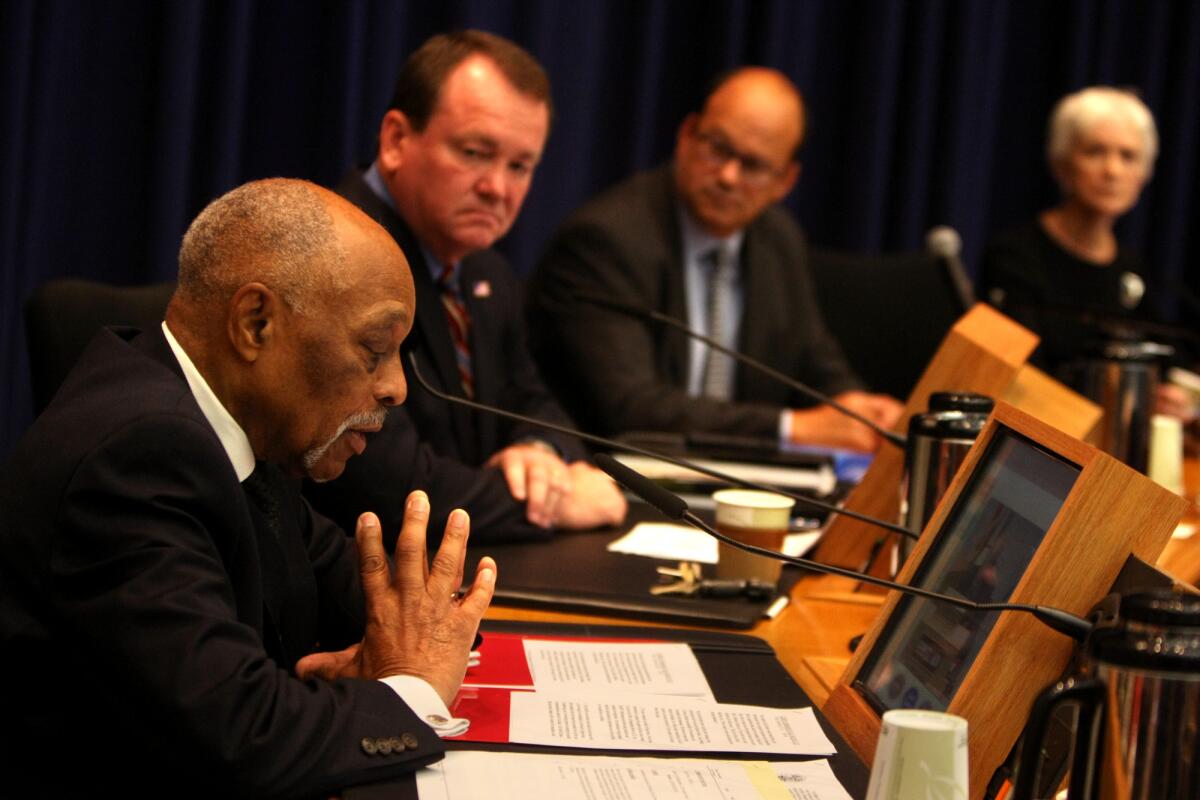L.A. County jail violence sheriff’s fault, panel says

- Share via
A blue-ribbon commission blamed Los Angeles County Sheriff Lee Baca on Friday for a pattern of excessive force by his deputies in the county jails, warning that Baca is running out of time to fix the problems.
The commission, which includes several former judges and a police chief, said Baca did not listen to repeated warnings from the department’s civilian watchdogs and inmates-rights advocates about conditions in the jail.
The panel’s scathing findings are expected to put pressure on the sheriff to more aggressively deal with problems in the nation’s largest jail system, which is the subject of a wide-ranging FBI criminal investigation.
FULL COVERAGE: Jails under scrutiny
Commissioners held Baca responsible for the scandal, which they attributed to a “failure of leadership.” The panel’s members said they considered calling for Baca to resign but decided against doing so, hoping that he would prove willing to carry out their recommendations.
Commissioner Jim McDonnell, chief of the Long Beach Police Department, said he was concerned that federal authorities would ask a judge to order reforms if Baca does not immediately implement the long list of proposed fixes. Such a move by the federal government would limit Baca’s ability to manage his own department and prove costly for the county.
McDonnell and other commissioners said they were disappointed with Baca’s testimony at a commission hearing earlier this year when the sheriff was asked how he could be held accountable and responded, “Don’t elect me.”
“His statement seemingly reflects a lack of genuine concern,” said Alex Busansky, a commissioner who is the president of the National Council on Crime and Delinquency, an Oakland-based nonprofit. “Real leaders do not need an election to teach them the difference between right and wrong.”
Robert C. Bonner, a former federal court judge who headed the U.S. Drug Enforcement Administration in the early 1990s, said Baca “seems to have had his head in the sand.” Still, Bonner said, he cautiously believed Baca would do what is right. “I hope I’m not proven wrong,” he said.
In his defense, Baca has said his senior managers never told him about jailer brutality but insists he has since taken dramatic steps to address the problems, such as creating an internal task force devoted to reforming his jails.
Baca’s spokesman, Steve Whitmore, rejected the commission’s criticism of the sheriff.
We believe that there is no failure of leadership,” Whitmore said. “The sheriff believes that his… loudest critics can be his best teachers.”
Whitmore said Baca needed time to review the commission’s recommendations before he could determine whether he would carry them all out.
The commission, which was created by the Board of Supervisors last year to examine allegations of jail abuse, released a 194-page report recommending more than 60 reforms that included a management shake up, harsher penalties for excessive force and dishonesty and the formation of a new civilian watchdog.
“If a chief executive officer in private business had remained in the dark or ignored problems plaguing one of the company’s primary services for years, that company’s board of directors likely would not have hesitated to replace the CEO,” the report said.
As an elected official, Baca cannot be forced to implement any of the commission’s recommendations, but Supervisor Gloria Molina has said she would call for his resignation if he refuses to embrace the reforms. The commission’s general counsel, Richard E. Drooyan, said it would be up to voters to hold Baca accountable if the sheriff fails to act decisively.
“If he doesn’t fix the jails,” Drooyan said, “he should not be reelected.”
The release of the report is a major milestone in a jail abuse scandal that erupted more than a year ago when The Times revealed the FBI was secretly investigating the jails. Federal agents went so far as to smuggle a cellphone through a corrupt jailer to an inmate working as a confidential informant. Other allegations of abuse and mismanagement followed in subsequent months.
The commission based its report on interviews with current and former sheriff’s officials, other jailhouse witnesses, testimony from experts and internal department records. Its investigation painted a grim image of Baca’s jails over the years. Among the findings were that top supervisors made jokes about inmate abuse, encouraged deputies to push ethical boundaries and ignored alarming signs of problems with excessive force.
Deputies “have used force against inmates when the force was disproportionate to the threat posed or there was no threat at all,” the commission concluded. It also addressed Baca’s contention that his underlings kept him in the dark: “A leader who does not want to hear about problems will not be told of them by those who work under him, and this appears to be the case here.”
The report criticized the sheriff for not disciplining senior managers who failed to address the jail problems, which commissioners wrote sent “a troubling message to a department in need of a clear directive that accountability is expected and will be enforced at all levels.”
The commission acknowledged that Baca has taken some steps to deal with the problems but said far more needed to be done.
The panel called on Baca to become “personally engaged in oversight of the jails” and to “hold his high level managers accountable for failing to address use of force problems.” Undersheriff Paul Tanaka, Baca’s top assistant, should have no responsibility for the department’s custody operations, the commission said. The commission accused Tanaka of exacerbating the jail’s problems by encouraging deputies to push the legal boundaries and discouraging supervisors from disciplining deputies involved in misconduct.
The commission called for the creation of an Office of Inspector General that would report to the Board of Supervisors and provide independent oversight of the sheriff’s department, conducting its own investigations, monitoring jail conditions and reviewing the department’s audits and inspections.
Such a move would represent an historic transformation of the department’s civilian monitoring and would echo reforms made by the city two decades ago in the wake of the 1991 videotaped beating of Rodney G. King. But any similar office at the county would have at least one significant difference. The city’s inspector general reports to an independent civilian police commission that has the authority to fire the police chief, who is not elected.
Supervisor Mark Ridley-Thomas said he would ask county executives to investigate what the Board of Supervisors would need to do to create a civilian commission and an inspector general to oversee the sheriff’s department.
“We can be sure of one thing,” he said in a statement, referring to the commission’s findings, “the Sheriff’s Department cannot police itself.”
Among the commission’s other recommendations were:
*Appointing a new head of custody with experience managing a large correctional facility who would answer directly to the sheriff.
*Revamping investigations and discipline of deputy misconduct and ending the practice of allowing sergeants to probe force incidents involving deputies they directly supervise.
*Establishing a firm zero-tolerance policy for acts of dishonesty.
*Creating a separate custody division with a professional workforce who would spend their careers in the jails.
*Adding more supervisors to monitor deputies in the jails.
*Creating a new internal audit and inspections division.
FULL COVERAGE: Jails under scrutiny
More to Read
Sign up for Essential California
The most important California stories and recommendations in your inbox every morning.
You may occasionally receive promotional content from the Los Angeles Times.












